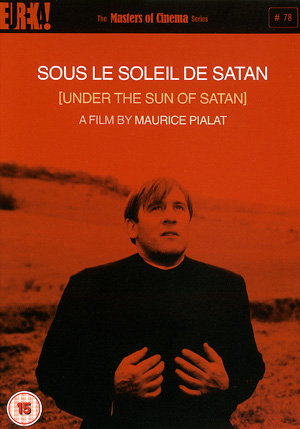
SOUS LE SOLEIL DE SATAN (UNDER THE SUN OF SATAN)
France, 1987, 93 minutes, Colour.
Gerard Depardieu, Sandrine Bonnaire, Maurice Pialat.
Directed by Maurice Pialat.
Under the Sun of Satan is based on a novel by celebrated French writer Georges Bernanos. He is best known for his novel Diary of a Country Priest which was filmed in 1950. This novel was filmed as a television film in 1971 with Maurice Garrel as the priest. Bernanos also wrote the novel Mouchette, filmed by Robert Presson, as well as The Dialogue of the Carmelites.
The film was adapted for the screen by Maurice Pialat and his wife, Sylvie. It is an austere presentation of Bernanos’ novel, with Pialat an author who was not entirely sympathetic to the Catholic setting of the film. Which means that the film is straightforward, but also has questions underlying the screenplay about the theology and spirituality presented.
Gerard Depardieu portrays a parish priest, under the guidance of a monsignor. The parish priest is a simple man, seemingly even one of God’s fools. However, he has inner torments as well as temptations. He has a strong sense of the presence of God, looking for God in nature, aware that there are continued problems – which he faces, even when Satan seems to be tempting him. He is also a vehicle of grace, a young boy coming to life after his prayer. However, the principal focus is on his relationship with a killer, played by Sandrine Bonnaire. He sees himself as a source of grace for her, even as she lives a profligate life.
Pialat has made the film in the style of Robert Bresson, a straightforward and austere style, called transcendental by Paul Schrader. This means that the film was well accepted by critics, even winning the Golden Palm at the Cannes film festival in 1987. However, Pialat was hissed as he went on stage to receive the award (and told the audience that he didn’t like them either). Audiences have found the themes and the treatment very difficult, assuming that they did not know much about the Catholicism presented as well as some of the theological implications of sin, temptation, free will, grace, miracles and healing.
1. Acclaim for the film? Golden Palm at Cannes? Audiences and their finding the film too difficult?
2. The work of Maurice Pialat, his style, austerity, the use of colour, light and darkness? Close-ups, tableaux? The emphasis on talk and dialogue? For theological and philosophical reflection? The attraction for the audience – and alienating them? The musical score, classic style?
3. The work of Georges Bernanos? His portrayal of the Catholic church in the 19th and 20th centuries? His focus on clergy, their vocation, their work and ministry? The repercussions of their vocational choice on themselves as persons, their life, relationships? The church as a model for behaviour? The role of the priest? The tradition of Gallic Jansenism, austerity and penitential attitudes? People as victims of God’s grace? The nature of sanctity, good and evil?
4. The adaptation of the novel, the characters, the dialogue? How cinematic?
5. Presuppositions about the Catholic church, about priests, their vocation, their life, their ministry, their obedience to the bishop? The authenticity of the priests? Training, qualifications, ordination? The role of grace, building on nature? Priests as victims, the role of mortification in their lives, the arguments for and against? The nature of priestly zeal, the sense of vocation, the sense of isolation? An intellectual theology and spirituality? An emotional theology and spirituality? Contemplation, prayer, miracles and healing?
6. The presence of Gerard Depardieu as the priest? Credible? In himself, his age, his hard work, the study, his ordination, zeal? The contemplatives and their advice? Talking with the parish priest? His experience of dark nights of the senses and soul? A sense of despair? Day by day, praying the Divine Office? Being directed by the parish priest? His walk in the countryside, looking at nature, the clouds over the sun? His encounter with the Devil, the Devil incarnate, the nature of the meeting, awareness of good and evil? His power, his insights? The encounter with Mouchette, her situation, the murder, her lovers? His talking with her, getting to know her, the effect? Her not having a sense of guilt? The subplot of the child, the death, trying to save the child? These signs for the discernment of the parish priest? The reaction to the death, the reappearance? The new church? His going, the other parish priest and the boy? The priest’s reputation, miracles, his being held up as a model, his return? Confession and his duties? His giving his life? The death mask?
7. The priest as a Christ figure, resembling Jesus in his life, ministry, victim?
8. The parish priest, his age, his worldly knowledge, his sound advice, relationship with the bishop, the visit, the theme of vocation and signs of vocation?
9. The people and their relationship to the clergy, the duty of going to mass and to church, basic beliefs? As congregations? Mouchette, her place in the village, the family? The children? the other parish priest?
10. The personification of the Devil? In this world? With the priest? The confrontation – and the title and the sun of Satan?
11. Mouchette, in herself, her life, her relationships, her killing her lover? The friendship with the priest, yet her disbelief? Talking, the future? The shooting and the guilt? The doctor and the deputy? Her pregnancy, the miscarriage and illness? Her parents? With the priest, her death? Her parents and the reaction? The other two men with whom she had a relationship?
12. The parents and the child? The impact on the priest?
13. The overall impact of the film? As intellectual? As emotional? Requiring reflection on the nature of faith and belief, commitment, service, discernment of vocation? The nature of the church?